

Sir Douglas Ralph (Doug) Nicholls. Sir Douglas Ralph Nicholls (1906-1988), footballer, pastor, activist and governor, was born on 9 December 1906 at Cummeragunja Aboriginal mission, New South Wales, fifth child of Herbert Nicholls, seasonal worker, and his wife Florence, née Atkinson.
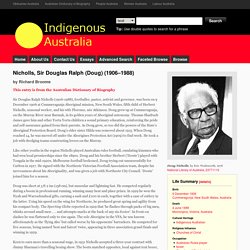
Doug grew up at Cummeragunja, on the Murray River near Barmah, in its golden years of Aboriginal autonomy. Thomas Shadrach James gave him and other Yorta Yorta children a sound primary education, reinforcing the pride and self-assurance gained from their parents. As Doug grew, so too did the powers of the State’s Aboriginal Protection Board. Doug’s elder sister Hilda was removed about 1915. When Doug reached 14, he was moved off under the Aborigines Protection Act (1909) to find work. Like other youths in the region Nicholls played Australian rules football, emulating kinsmen who had won local premierships since the 1890s. Doug was short at 5 ft 2 ins (158 cm), but muscular and lightning fast. Nicholls exhibited leadership qualities.
Heroes in The Struggle for Justice - Doug Nicholls. Sir Douglas Ralph (Doug) Nicholls (1906 - 1988) by Richard Broome This article was published in Australian Dictionary of Biography, Volume 18, (MUP), 2012 Sir Douglas Ralph Nicholls (1906-1988), footballer, pastor, activist and governor, was born on 9 December 1906 at Cummeragunja Aboriginal mission, New South Wales, fifth child of Herbert Nicholls, seasonal worker, and his wife Florence, née Atkinson.
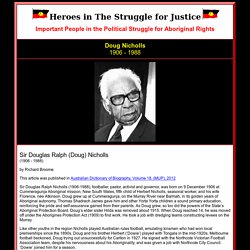
Doug grew up at Cummeragunja, on the Murray River near Barmah, in its golden years of Aboriginal autonomy. Thomas Shadrach James gave him and other Yorta Yorta children a sound primary education, reinforcing the pride and self-assurance gained from their parents. Like other youths in the region Nicholls played Australian rules football, emulating kinsmen who had won local premierships since the 1890s. Doug was short at 5 ft 2 ins (158 cm), but muscular and lightning fast.
Nicholls exhibited leadership qualities. On 2 June 1941 Nicholls enlisted in the Citizen Military Forces. Douglas Nicholls – A tribute to influential Australian Christians. Pastor Sir Douglas Nicholls (1906 – 1988 ) pastor, athlete, footballer, governor Pastor Sir Douglas Nicholl was born in Cumeroogunga, near the Murray River in New South Wales, and was Australia’s first Aboriginal state governor.
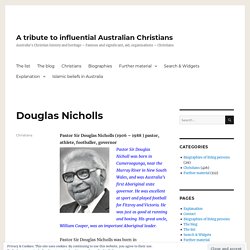
He was excellent at sport and played football for Fitzroy and Victoria. He was just as good at running and boxing. His great uncle, William Cooper, was an important Aboriginal leader. Sir Douglas Ralph (Doug) Nicholls. Sir Douglas Ralph Nicholls (1906-1988), footballer, pastor, activist and governor, was born on 9 December 1906 at Cummeragunja Aboriginal mission, New South Wales, fifth child of Herbert Nicholls, seasonal worker, and his wife Florence, née Atkinson.
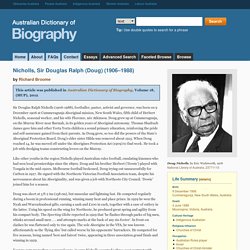
Doug grew up at Cummeragunja, on the Murray River near Barmah, in its golden years of Aboriginal autonomy. Thomas Shadrach James gave him and other Yorta Yorta children a sound primary education, reinforcing the pride and self-assurance gained from their parents. As Doug grew, so too did the powers of the State’s Aboriginal Protection Board. Doug’s elder sister Hilda was removed about 1915. When Doug reached 14, he was moved off under the Aborigines Protection Act (1909) to find work. Like other youths in the region Nicholls played Australian rules football, emulating kinsmen who had won local premierships since the 1890s. Doug was short at 5 ft 2 ins (158 cm), but muscular and lightning fast. Nicholls exhibited leadership qualities. The incredible story of Sir Doug Nicholls - Amnesty International Australia.
26 May 2017 “People would come from everywhere just to come up and shake Dad’s hand” — Aunty Pam Pederson Sir Doug Nicholls lived an incredible life.
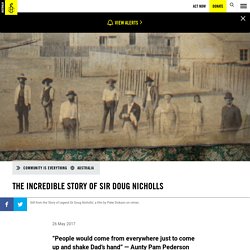
Douglas nicholls. Collaborating for Indigenous Rights 1957-1973. (1906 to 1988) Source: State Library of Victoria At the time of the investigation into the state of people living in the Warburton Ranges, Doug Nicholls was founding pastor at the Fitzroy Church of Christ Aborigines' Mission.
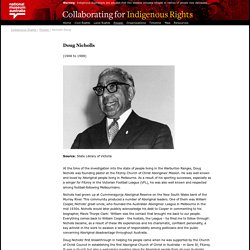
He was well known and loved by Aboriginal people living in Melbourne. As a result of his sporting successes, especially as a winger for Fitzroy in the Victorian Football League (VFL), he was also well known and respected among football-following Melbournians. Nicholls had grown up at Cummeragunja Aboriginal Reserve on the New South Wales bank of the Murray River. Fighting for Lake Tyers - No 85 May 2010 - La Trobe Journal. Morale at Lake Tyers was low.
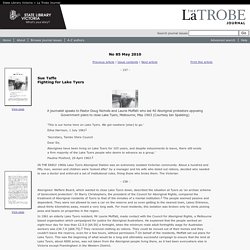
There were twice-weekly rations. Educational opportunities were limited to basic primary school education provided on the reserve and, as a consequence, residents were totally out of touch with the processes involved in influencing Government decision-making. How then was a campaign to be waged? The power of friendships and the skill of an organised group of activists bent on changing the direction of public policy regarding the future of Lake Tyers were crucial. Fortunately, the wider community was beginning to take notice of issues like the Tyers community's struggle to keep their homes. The Council for Aboriginal Rights When it was established in 1951, the Council for Aboriginal Rights (Victoria) was a body which was ahead of its time in two important respects. People in Australian society. Shirley Andrews was one of the key activists responsible for the formation of the Federal Council for Aboriginal Advancement (FCAA) in 1958.
Women. Darebin Heritage - Sir Douglas Nicholls. Pastor Doug Nicholls was born in Cummeragunja NSW in 1906.
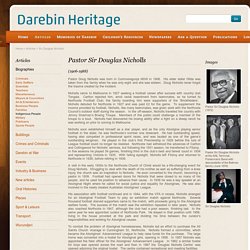
His elder sister Hilda was taken from the family when he was only eight and she was sixteen. Doug Nicholls never forgot the trauma created by the incident. Nicholls came to Melbourne in 1927 seeking a football career after success with country club Tongala. Carlton rejected him, amid racial resentment from teammates, so he turned to Northcote Football Club; the family boarding him were supporters of the ‘Brickfielders’. Nicholls debuted for Northcote in 1927 and was paid £2 for the game. Nicholls soon established himself as a star player, and as the only Aborigine playing senior football in the state; he was Northcote’s number one drawcard. A visit in the early 1930s to the Northcote Church of Christ would be a life-changing event for Doug Nicholls. His association with football continued and in 1944, with the VFA in recess, Nicholls arranged for an Aboriginal Football Team to play an exhibition match against Northcote.
Sources. Australian Institute of Aboriginal and Torres Strait Islander Studies. Pastor Doug Nicholls At the time of the investigation into the state of people living in the Warburton Ranges, Doug Nicholls was founding pastor at the Fitzroy Church of Christ Aborigines' Mission.

He was well known and loved by Aboriginal people living in Melbourne. As a result of his sporting successes, especially as a winger for Fitzroy in the Victorian Football League (VFL), he was also well known and respected among football-following Melbournians.